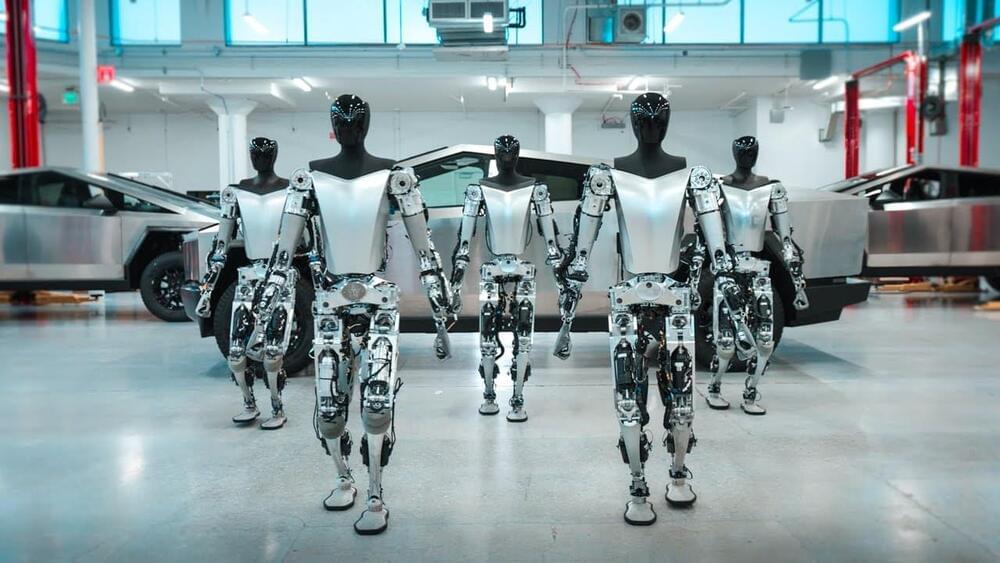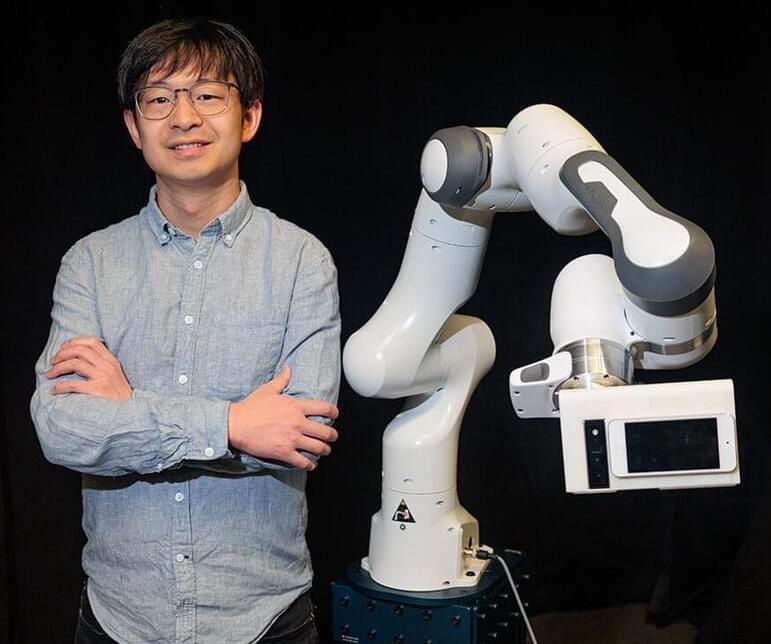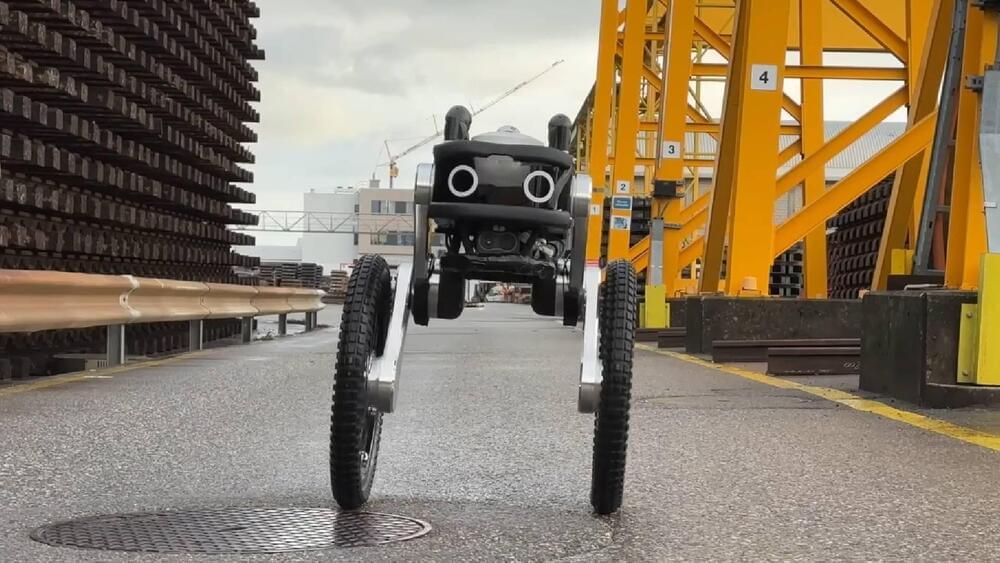Multiple fully Tesla-made bots now walking around & learning about the real world 🤖
Join the Tesla AI team → https://tesla.com/ai

Multiple fully Tesla-made bots now walking around & learning about the real world 🤖
Join the Tesla AI team → https://tesla.com/ai
With AI chatbots’ propensity for making things up and spewing bigoted garbage, one firm founded by ex-OpenAI researchers has a different approach — teaching AI to have a conscience.
As Wired reports, the OpenAI competitor Anthropic’s intriguing chatbot Claude is built with what its makers call a “constitution,” or set of rules that draws from the Universal Declaration of Human Rights and elsewhere to ensure that the bot is not only powerful, but ethical as well.
Jared Kaplan, a former OpenAI research consultant who went on to found Anthropic with a group of his former coworkers, told Wired that Claude is, in essence, learning right from wrong because its training protocols are “basically reinforcing the behaviors that are more in accord with the constitution, and discourages behaviors that are problematic.”
In December 2022, founder Elon Musk gave an update on his other, other company, the brain implant startup Neuralink. As early as 2020, the company had been saying it was close to starting clinical trials of the implants, but the December update suggested those were still six months away. This time, it seems that the company was correct, as it now claims that the Food and Drug Administration (FDA) has given its approval for the start of human testing.
Neuralink is not ready to start recruiting test subjects, and there are no details about what the trials will entail. Searching the ClinicalTrials.gov database for “Neuralink” also turns up nothing. Typically, the initial trials are small and focused entirely on safety rather than effectiveness. Given that Neuralink is developing both brain implants and a surgical robot to do the implanting, there will be a lot that needs testing.
It’s likely that these will focus on the implants first, given that other implants have already been tested in humans, whereas an equivalent surgical robot has not.

A group of computer scientists from the University of Toronto wants to make it easier to film how-to videos.
The team of researchers have developed Stargazer, an interactive camera robot that helps university instructors and other content creators create engaging tutorial videos demonstrating physical skills.
Glioblastoma Multiforme (GBM) is the most aggressive and most common primary malignant brain tumor. The age of GBM patients is considered as one of the disease’s negative prognostic factors and the mean age of diagnosis is 62 years. A promising approach to preventing both GBM and aging is to identify new potential therapeutic targets that are associated with both conditions as concurrent drivers. In this work, we present a multi-angled approach of identifying targets, which takes into account not only the disease-related genes but also the ones important in aging. For this purpose, we developed three strategies of target identification using the results of correlation analysis augmented with survival data, differences in expression levels and previously published information of aging-related genes.
Join top executives in San Francisco on July 11–12, to hear how leaders are integrating and optimizing AI investments for success. Learn More
Why do people become ethical hackers? Given the negative connotations that the word “hacker” has unfortunately acquired over the past few decades, it’s tough to understand why anyone would ascribe themselves to that oxymoron.
Yet, ethical hackers are playing an increasingly vital role in cybersecurity, and the ranks of the ethical hacking community are growing significantly. If you’re thinking about working with or hiring ethical hackers — or even becoming one yourself — it’s important to understand what makes this unique breed of cyber-pro tick.
A team of engineers at the University of Colorado Boulder has designed a new class of tiny, self-propelled robots that can zip through liquid at incredible speeds—and may one day even deliver prescription drugs to hard-to-reach places inside the human body.
The researchers describe their mini healthcare providers in a paper published last month in the journal Small.
“Imagine if microrobots could perform certain tasks in the body, such as non-invasive surgeries,” said Jin Lee, lead author of the study and a postdoctoral researcher in the Department of Chemical and Biological Engineering. “Instead of cutting into the patient, we can simply introduce the robots to the body through a pill or an injection, and they would perform the procedure themselves.”
Israeli-based health tech company Cordio has developed machine learning software that can be downloaded to a smartphone and help keeps cardiac patients out of the hospital.
One day in the future.
It’s a simple daily habit that could save their life, because one day after repeating their daily refrain, their doctor might be notified that a patient is at risk of heart failure without immediate care.
Continue reading “This AI Startup Aims To Predict Heart Failure Before It Happens” »
OpenAI’s CEO Sam Altman has been touring Europe for the past few days, meeting head of governments and startup communities to talk about AI regulation, ChatGPT and beyond. In his latest on-stage appearance at Station F in Paris, Altman answered questions from local entrepreneurs and shared his views about artificial intelligence.
A few days ago, Altman met with Emmanuel Macron. Station F director Roxanne Varza first asked him about the content of the conversation. As expected, the discussion mostly revolved around regulation. “It was great, we talked about how to get the balance right between protection with this technology and letting it flourish,” Altman said.
He then explained why he’s been traveling from one country to another at a frenetic pace. “The reason for doing this trip is to get out of the Bay Area tech bubble,” he said.

Security guards are extremely useful, some would say necessary. But they can be quite expensive and there simply aren’t enough of them to put them everywhere they need to be.
In Europe, people living in Switzerland have been privy to witnessing a patrol bot, developed by a robotics start-up from ETH Zurich called Ascento, that could soon take the place of human security guards. The machine has thus far been successfully acting as a guard for Swiss security firm Securitas AG.
Continue reading “This two-wheeled robot is Switzerland’s latest security guard” »
